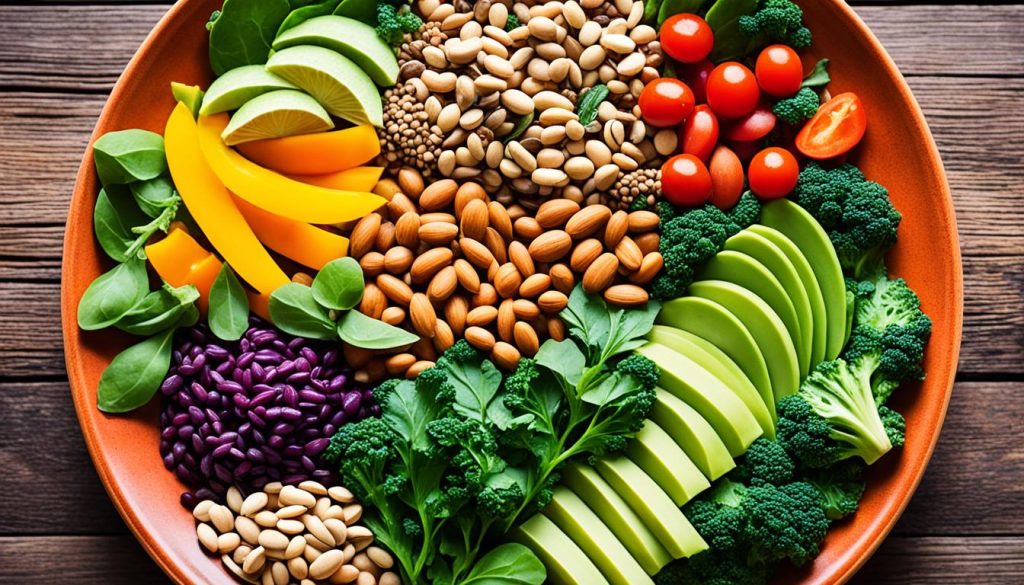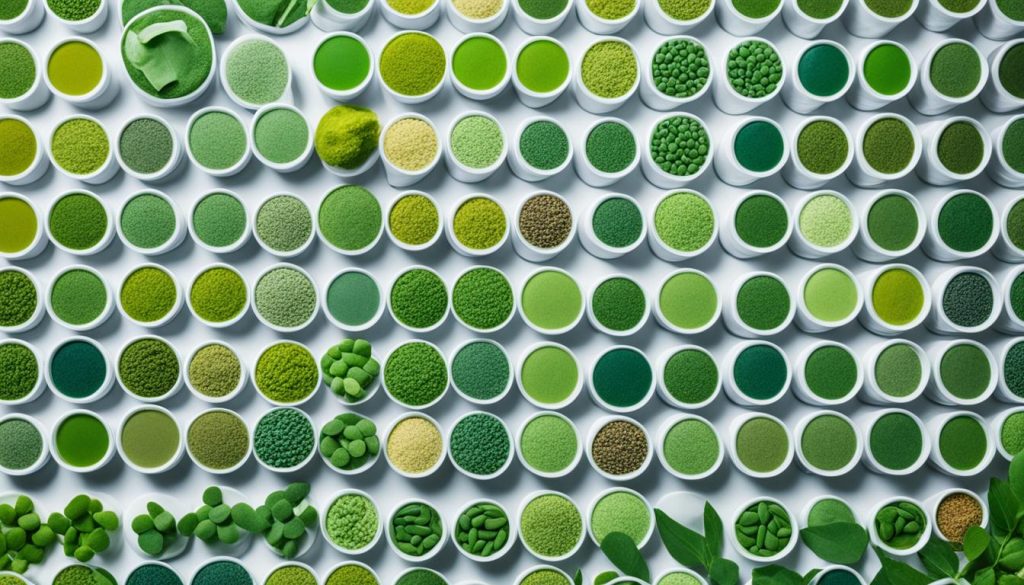Eating a vegan diet can be a healthy way to eat when your meals are full of vegetables, fruits, legumes, and whole grains. It’s important to have a well-planned vegan diet to ensure you don’t miss out on essential nutrients. Here are some simple tips for a healthy vegan diet.
Make Use of Vegan Food List for Beginners
If you’re new to veganism, using a vegan food list for beginners can be incredibly helpful. These lists provide guidance on essential vegan pantry staples and ingredients that are commonly used in vegan recipes. It can serve as a handy reference when shopping for groceries and planning your meals. By having a well-stocked pantry with vegan-friendly options, you can easily create balanced and nutritious meals.
Remember, a well-balanced vegan diet is not only good for your health but also contributes to a more sustainable and ethical food system. By choosing plant-based nutrition, you are making a positive impact on both your own well-being and the environment.
Nutrients to Focus on in a Vegan Diet
When following a vegan diet, it’s important to pay attention to certain nutrients that may be more challenging to obtain. Incorporating these nutrients into your meals can help ensure you’re getting the necessary nourishment for optimal health and wellbeing.
The Key Nutrients
Here are some essential nutrients that should be prioritized in a vegan diet:
- Calcium: Dairy products are the usual source of calcium, but for vegans, leafy greens like kale, broccoli, and fortified plant-based milk alternatives such as almond milk and soy milk are excellent options.
- Iron: Plant-based iron sources include legumes, dark leafy greens, fortified cereals, and seeds. Consuming vitamin C-rich foods along with iron-rich foods can enhance iron absorption.
- Vitamin B12: This vitamin primarily comes from animal products, so vegans are recommended to include fortified foods like plant-based milk alternatives, breakfast cereals, and nutritional yeast. Consulting a registered dietitian for guidance on B12 supplementation is essential.
- Omega-3 Fatty Acids: Flaxseeds, chia seeds, walnuts, and algae-based supplements are excellent sources of omega-3 fatty acids for vegans.
- Iodine: Seaweed, iodized salt, and fortified plant-based milk alternatives are good sources of iodine for vegans.
To ensure you’re meeting your nutritional needs, it’s beneficial to follow a well-planned vegan diet meal plan. Consulting with a registered dietitian can further help tailor a meal plan that aligns with your specific goals and preferences, whether you’re looking to maintain a healthy weight or achieve weight loss on a vegan diet.
Overall, a vegan diet offers many benefits, including reduced risk of chronic diseases, weight management, and ethical considerations. By paying attention to these vital nutrients and incorporating a variety of plant-based foods, you can thrive on a vegan diet while reaping its numerous advantages.

Considering Supplements for a Vegan Diet
While a well-planned vegan diet can provide all the necessary nutrients, some individuals may still need to consider supplements. It’s essential to ensure that you’re getting all the vital nutrients to maintain a healthy vegan diet.
There are a few key nutrients that may require supplementation on a vegan diet:
- Vitamin B12: Vitamin B12 is naturally found in animal-based foods and is crucial for nerve function and DNA synthesis. Vegans can get their vitamin B12 by taking a daily supplement or consuming fortified foods like plant-based milk alternatives or breakfast cereals.
- Vitamin D: Vitamin D plays a critical role in bone health and immune function. While the primary source of vitamin D is sunlight, it can be challenging to obtain sufficient amounts solely through sunlight exposure. Vegans can consider taking a vitamin D supplement or consuming fortified plant-based milk alternatives or cereals.
- Iodine: Iodine is essential for regulating thyroid function and is commonly found in seafood. Vegans can obtain iodine from iodized salt, seaweed, or iodine supplements.
- Omega-3 Fatty Acids: Omega-3 fatty acids are beneficial for heart health and brain function. While algae-based supplements are available for vegans, including plant-based sources like flaxseeds, chia seeds, and walnuts in your diet can also provide omega-3 fatty acids.
- Selenium: Selenium is an antioxidant mineral that helps protect against oxidative stress and supports thyroid function. Vegans can obtain selenium from Brazil nuts, mushrooms, and whole grains. However, for consistent and adequate selenium intake, a supplement may be considered.
It’s important for beginners to be aware of these potential nutrient gaps and consult with a healthcare professional or registered dietitian to determine if supplements are necessary. They can provide guidance tailored to your individual needs and ensure you’re maintaining a healthy vegan diet.
Remember, while supplements can be beneficial, they should not replace a well-rounded diet that includes a variety of nutritious plant-based foods. Supplements should be used to complement a vegan diet and serve as a safeguard to ensure you’re meeting your nutritional needs.

Practical Tips for a Healthy Vegan Lifestyle
In addition to following a healthy vegan diet, there are other practices that can contribute to a sustainable and ethical lifestyle. By incorporating these practical tips into your daily routine, you can make a positive impact on the environment and promote animal welfare.
1. Choose Ethical Eating
Ethical eating is an important aspect of a vegan lifestyle. This means opting for food choices that align with your values and beliefs. Support local farmers and choose organic produce whenever possible. By doing so, you support sustainable farming practices and reduce the carbon footprint associated with long-distance transport of food.
2. Reduce Food Waste
Reducing food waste is not only good for the environment but also helps save money. Plan your meals ahead, use leftovers creatively, and compost food scraps. Take stock of what you have in your pantry and fridge before going grocery shopping to avoid unnecessary purchases.
3. Embrace Eco-Friendly Packaging
Eco-friendly packaging options, such as reusable containers and bags, help reduce plastic waste and promote sustainability. Look for companies that prioritize eco-friendly packaging and support their efforts by choosing their products.

4. Stay Active
Physical activity is important for overall health and wellbeing. Incorporate regular exercise into your routine to stay fit and energized. Engage in activities that you enjoy, such as yoga, cycling, or hiking.
5. Practice Mindful Eating
Mindful eating involves being present and fully aware of the food you consume. Take the time to appreciate the flavors and textures of your meals. Chew slowly, savor each bite, and listen to your body’s hunger and fullness cues. This practice promotes a healthy relationship with food and prevents overeating.
By following these practical tips, you can make a positive impact on the planet while enjoying the health benefits of a vegan lifestyle. Remember, every small change counts when it comes to creating a sustainable and ethical future.
Tips for a Well-Balanced Vegan Diet
When following a vegan diet, it is important to ensure you are getting all the necessary nutrients to support your overall health and well-being. By incorporating a variety of healthy foods into your meals, you can create a well-balanced vegan diet that nourishes your body.
Include Plenty of Fruits and Vegetables
Fruits and vegetables should form the foundation of your vegan diet. They are rich in essential vitamins, minerals, and antioxidants that promote good health. Aim to include a variety of colors in your meals to maximize nutrient intake. For example, include leafy greens like spinach, kale, and Swiss chard as well as vibrant berries, citrus fruits, and cruciferous vegetables.
Choose Whole Grains and Legumes
Whole grains and legumes are excellent sources of fiber, protein, and other essential nutrients. Incorporate whole grains like quinoa, brown rice, oats, and whole wheat bread into your diet. Pair them with legumes such as chickpeas, lentils, and black beans for a satisfying and nutritious meal. These options not only provide essential nutrients but also help keep you feeling full and satisfied.
Opt for Plant-Based Proteins
Protein is a crucial component of a balanced vegan diet. While plant-based proteins may not be as dense as animal proteins, they can still provide all the necessary amino acids when consumed in combination. Include sources such as tofu, tempeh, and beans in your meals. These options are not only packed with protein but also offer additional nutrients like iron and calcium.
Explore Vegan Food Recipes
One of the exciting aspects of following a vegan diet is the abundance of delicious and creative recipes available. Experiment with vegan food recipes to discover new flavors and textures. From hearty stews and stir-fries to refreshing salads and smoothies, there are endless possibilities to explore. Incorporating a variety of recipes into your meal plan will help you stay motivated and enjoy a diverse range of flavors.
Conclusion
In summary, a well-planned vegan diet offers a multitude of benefits for your health and wellbeing. By embracing plant-based nutrition and incorporating a variety of wholesome foods into your meals, you can improve heart health, effectively manage weight, and reduce the risk of chronic diseases.
It’s important to create a balanced vegan diet meal plan that ensures you receive all the necessary nutrients. By focusing on a diverse range of plant-based protein sources, such as legumes, tofu, and tempeh, along with nutrient-rich fruits and vegetables, you can thrive on a vegan diet.
However, before making any significant dietary changes or if you have specific health concerns, it’s always advisable to consult with a healthcare professional. They can provide personalized guidance and ensure that your vegan diet meets your individual nutritional needs.
FAQs
Is a vegan diet healthy?
Yes, a well-planned vegan diet can be a healthy way to eat. By focusing on a variety of fruits, vegetables, legumes, whole grains, and plant-based proteins, individuals can obtain all the necessary nutrients for optimal health.
What foods should I include in a well-balanced vegan diet?
A well-balanced vegan diet should include plenty of fruits and vegetables, whole grains, legumes, and plant-based proteins like tofu, tempeh, and beans. It’s also important to incorporate fortified dairy alternatives, such as soya drinks and yoghurts, into your meals.
Which nutrients should I pay attention to in a vegan diet?
On a vegan diet, it’s important to focus on nutrients like calcium, iron, vitamin B12, omega-3 fatty acids, and iodine. These can be obtained from foods like leafy greens, fortified plant-based milk alternatives, nuts, seeds, and fortified breakfast cereals.
Do I need to take supplements on a vegan diet?
Some individuals may need to consider supplements on a vegan diet, particularly for nutrients like vitamin B12, vitamin D, iodine, omega-3 fatty acids, and selenium. It’s recommended to consult with a healthcare professional or registered dietitian to determine if supplementation is necessary for you.

